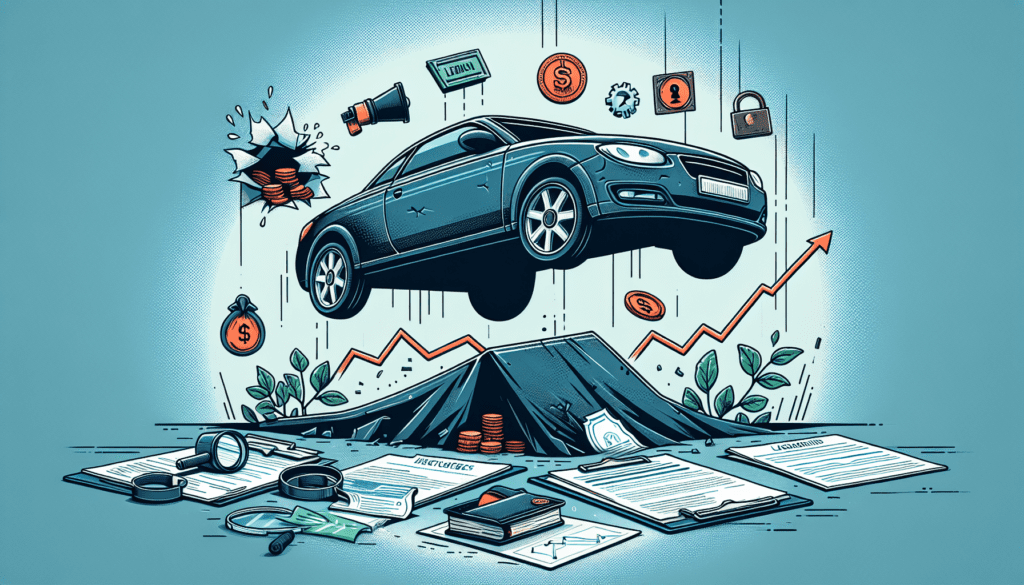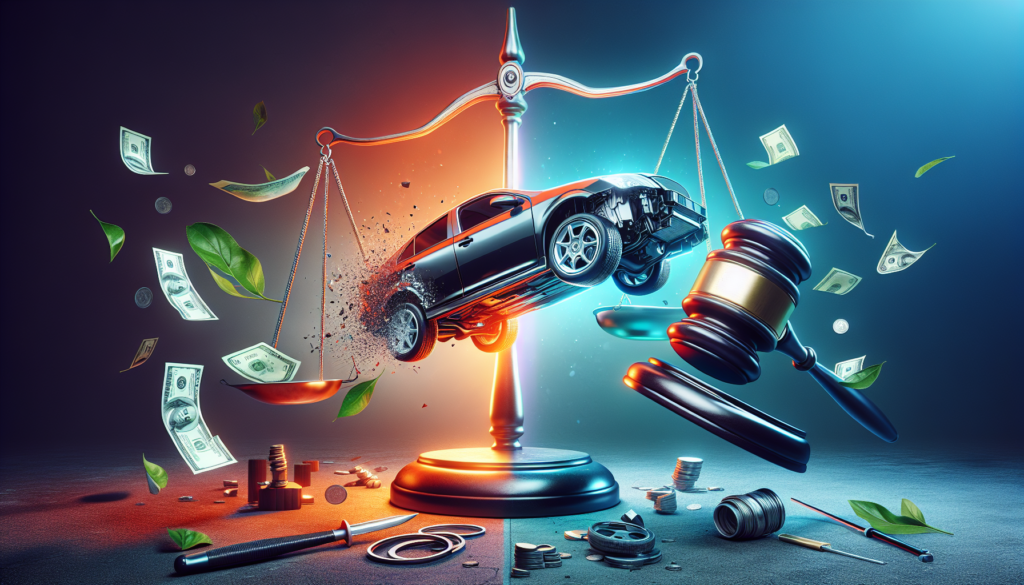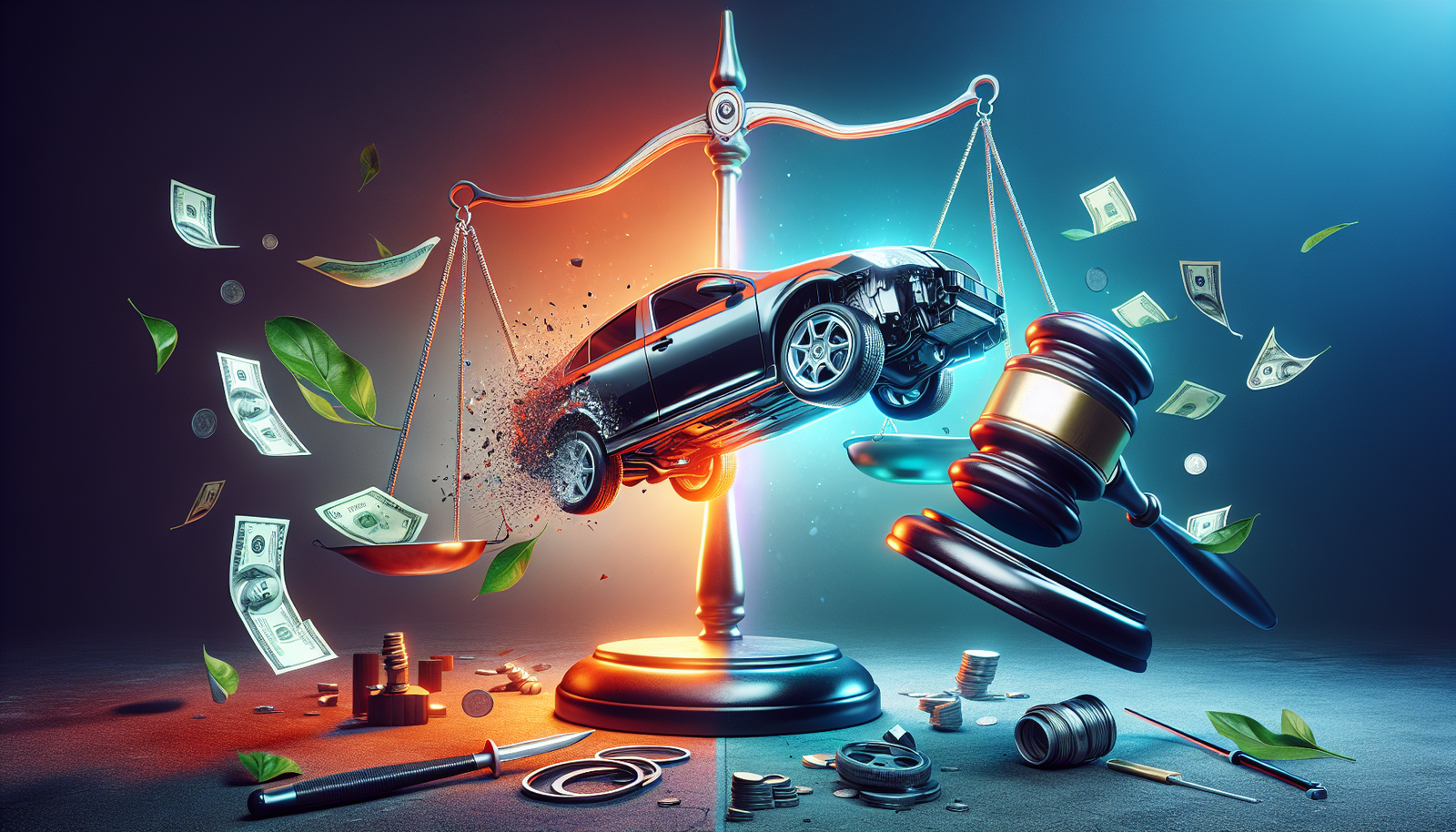Do you have a passion for cars and a desire to make some extra money? Car flipping might be the perfect venture for you. However, before diving into this potentially lucrative business, it’s important to understand the risks involved and how to mitigate them. From unexpected repairs to legal issues, navigating the world of car flipping requires knowledge and caution. But don’t worry, in this article, we will explore the various risks associated with car flipping and provide valuable tips and strategies to help you mitigate them, ensuring a successful and profitable venture. So, let’s embark on this exciting journey together!
Risks in Car Flipping
Car flipping can be an exciting and potentially profitable venture, but it is not without its fair share of risks. Whether you are a seasoned car flipper or just starting out in the industry, understanding and mitigating these risks is crucial to ensuring your success. In this article, we will explore the various risks associated with car flipping and provide actionable steps to mitigate them.
Financial Risks
When it comes to car flipping, financial risks are at the forefront of every flipper’s mind. Let’s delve into some of the financial risks you may encounter and how to mitigate them.
Initial Investment
One of the first financial risks you will face when flipping cars is the initial investment. Buying a used car to fix and resell requires a significant amount of capital upfront. However, if you fail to sell the car for a profit, you may end up losing a substantial portion of your investment.
To mitigate this risk, it is essential to conduct thorough research before making any purchase. Analyze market trends, demand, and potential resale value to ensure you are making a wise investment decision.
Capital Loss
Flipping cars is a risky business, and there is always the possibility of incurring a loss. Even if you have done your due diligence, unforeseen circumstances can arise, making it challenging to sell the car at your desired price.
To mitigate the risk of capital loss, it is crucial to have a contingency plan. Set aside a portion of your budget specifically for unexpected expenses or price adjustments, allowing you some financial flexibility.
Unanticipated Expenses
Car flipping often involves making repairs and improvements to increase the vehicle’s value. However, there is always a chance that you may encounter unanticipated expenses along the way. These unexpected costs can quickly eat into your potential profit margin.
To mitigate this risk, it is essential to have a detailed budget and financial plan in place. Leave some room in your budget for unforeseen expenses, ensuring that you are not caught off guard when something unexpected arises.
Incorrect Pricing
Determining the right price for a flipped car can be a challenging task. Pricing it too high may deter potential buyers, while pricing it too low may result in a smaller profit margin or even a loss.
To mitigate the risk of incorrect pricing, conduct an accurate valuation of the car based on factors such as its condition, mileage, and market demand. Consider seeking advice from experienced car flippers or professionals in the industry to ensure that you are pricing your vehicles competitively.

This image is property of pixabay.com.
Legal Risks
In addition to financial risks, car flippers also face various legal risks. Let’s take a closer look at these risks and how to mitigate them.
Title Problems
One prominent legal risk in car flipping is encountering title problems. This can include issues such as incorrect ownership information, stolen vehicles, or salvage titles.
To mitigate this risk, always conduct a thorough title check and verification before purchasing any vehicle. Ensure that the title is clear and legitimate, reducing the chance of encountering legal complications later on.
Unresolved Liens
Another legal risk that car flippers may face is dealing with unresolved liens on a vehicle. If a lien is present, the seller may not legally be able to transfer ownership to you.
Mitigate this risk by conducting a lien search before purchasing a vehicle. This will ensure that there are no outstanding financial obligations or liens on the car, protecting you from potential legal issues down the line.
Illegal Modifications
Car flippers must be cautious of purchasing and selling vehicles with illegal modifications. These can range from unauthorized engine upgrades to illegally tinted windows or altered VIN numbers.
To mitigate this risk, it is crucial to inspect the vehicle thoroughly and ensure that it complies with all legal requirements and regulations. Avoid purchasing vehicles with suspicious modifications, as they can lead to legal consequences.
Deceptive Practices
Car flipping, like any other business, can involve deceptive practices by unscrupulous individuals. This can include misrepresentation of the vehicle’s condition, mileage tampering, or concealing important information.
To mitigate this risk, always maintain transparent business practices. Practice honesty and integrity in your dealings with both sellers and buyers. Conduct thorough inspections and disclose any information that may impact the car’s value or safety.
Safety Risks
Aside from financial and legal risks, ensuring the safety of the flipped vehicles is crucial. Let’s explore some of the safety risks associated with car flipping and how to mitigate them.
Hidden Damage
One of the safety risks when purchasing and selling used cars is hidden damage. The vehicle may have been involved in accidents or incidents that were not accurately disclosed or repaired.
To mitigate this risk, conduct a comprehensive inspection of the vehicle before purchasing it. Hire a professional mechanic to assess the car’s condition thoroughly and identify any hidden damage that could compromise its safety.
Recalls
Another safety risk to consider is the presence of unrepaired recalls. Recalls are issued when a manufacturer identifies a safety defect in a particular vehicle model. If these recalls are not addressed, the car’s safety could be compromised.
To mitigate this risk, check for any outstanding recalls on the vehicle you are considering purchasing. Register the vehicle with the manufacturer to ensure that you receive any recall notices promptly and address them in a timely manner.
Inadequate Repairs
When flipping cars, there is always a risk of coming across vehicles that have been improperly repaired. Inadequate repairs can compromise the structural integrity and safety of the vehicle.
To mitigate this risk, hire qualified professionals to perform any necessary repairs. Work with reputable repair shops and ensure that the repairs are done correctly, following the manufacturer’s guidelines and industry standards.
Vehicle History
Understanding a vehicle’s history is crucial in assessing its safety. Accidents, flood damage, or other incidents could impact the car’s performance and safety.
To mitigate this risk, obtain a comprehensive vehicle history report for each car you consider purchasing. This report will provide you with valuable information about the car’s past, including any accidents or damage it may have sustained.

This image is property of pixabay.com.
Market Risks
In the world of car flipping, market risks are inevitable. Let’s explore some of the market risks you may encounter and how to mitigate them.
Fluctuating Demand
One of the market risks in car flipping is the fluctuating demand for certain types of vehicles. The demand for specific models or features can change over time, impacting the profitability of your flips.
To mitigate this risk, stay informed about market trends and demand. Follow industry news, consult with experienced car flippers, and adjust your inventory and pricing accordingly to align with the current demand.
Seasonal Variations
Different seasons can affect the demand for certain types of vehicles. For example, convertibles may be in high demand during the summer months but less desirable in the winter.
To mitigate this risk, consider the seasonal variations in demand when purchasing vehicles for flipping. Plan your inventory and sales strategy accordingly to optimize profitability throughout the year.
Competitive Pricing
In a competitive market, pricing your flipped vehicles competitively is crucial. If your prices are significantly higher than your competitors’, potential buyers may choose a more affordable option.
To mitigate this risk, research the market and analyze the pricing of similar vehicles. Price your flips competitively to attract potential buyers while still allowing for a reasonable profit margin.
Market Saturation
Market saturation occurs when there is an excess supply of vehicles in the market, leading to increased competition and potentially lower profits.
To mitigate this risk, carefully track market trends and inventory levels. Avoid purchasing excessive amounts of inventory that may lead to market saturation. Instead, focus on finding unique or in-demand vehicles that will stand out in a crowded market.
Mechanical Risks
In addition to financial, legal, safety, and market risks, car flippers must also consider potential mechanical risks. Let’s explore some of these risks and how to mitigate them.
Unidentified Issues
When purchasing used cars for flipping, there is always a risk of encountering unidentified mechanical issues. These issues may not be apparent during initial inspections and can cause significant problems later on.
To mitigate this risk, conduct a thorough mechanical inspection of the vehicle before purchasing it. Hire a qualified mechanic who can identify any potential issues and advise you on the estimated repair costs.
Poor Quality Repairs
Some used cars may have undergone repairs before reaching your hands, and the quality of these repairs may vary. Poor quality repairs can lead to recurring issues and potential safety hazards.
To mitigate this risk, only work with qualified mechanics and reputable repair shops. Request documentation or receipts for any repairs done on the vehicle you are considering for flipping. Avoid purchasing vehicles with a history of poor quality repairs.
Hidden Maintenance Requirements
Cars require regular maintenance to ensure their optimal performance and safety. A lack of proper maintenance can lead to mechanical failures and costly repairs.
To mitigate this risk, ensure that the vehicles you purchase for flipping have a documented maintenance history. Track the vehicle’s maintenance schedule and perform any necessary maintenance before selling it. This will provide potential buyers with peace of mind and reduce the risk of mechanical issues.
Resale Value
The resale value of a flipped car is a significant concern for car flippers. If the vehicle’s value depreciates significantly during the time it takes to complete repairs and find a buyer, your profit margin could be impacted.
To mitigate this risk, keep a close eye on the market and fluctuations in resale values. Analyze the demand for the specific vehicle you are flipping and adjust your pricing and selling strategy accordingly.

This image is property of pixabay.com.
Mitigating Financial Risks
Now that we have explored the various financial risks involved in car flipping, let’s discuss how to mitigate them effectively.
Thorough Research
Before investing in any vehicle, conduct thorough research. Analyze market trends, demand, and potential resale value. Make informed decisions based on data to reduce the risk of investing in an unpromising flip.
Budgeting and Financial Planning
Creating a detailed budget and financial plan is crucial in mitigating financial risks. Account for all potential expenses, leave room for unexpected costs, and prioritize profitability. Stick to your budget and financial plan throughout the flipping process.
Accurate Valuation
Accurately valuing the vehicles you plan to flip is essential to mitigate the risk of overpricing or underpricing. Consider factors such as the car’s condition, mileage, market demand, and comparable sales data. Seek advice from experienced flippers or professionals to ensure your valuations are accurate.
Professional Inspection
Hiring a professional mechanic to inspect the vehicles you plan to purchase is a vital step in mitigating financial risks. A thorough inspection can uncover hidden issues that may impact the car’s value and profitability. Invest in professional inspections to make informed purchasing decisions.
Mitigating Legal Risks
To mitigate legal risks in car flipping, follow these steps.
Title Check and Verification
Always conduct a comprehensive title check and verification before purchasing any vehicle. Ensure the title is clear and legitimate to avoid legal complications.
Lien Search
Before finalizing a purchase, perform a lien search to confirm that there are no outstanding financial obligations or liens on the vehicle. This will protect you from potential legal issues related to ownership.
Avoiding Illegal Modifications
Avoid purchasing vehicles with illegal modifications. Inspect the vehicle thoroughly, and if any modifications appear questionable or unauthorized, steer clear to mitigate legal risks.
Transparent Business Practices
Maintain transparent and honest business practices to mitigate legal risks. Disclose all relevant information about the cars you are flipping, including any previous accidents or damage. Be forthright with sellers and buyers to build trust in your business.

Mitigating Safety Risks
To ensure the safety of the flipped vehicles, follow these steps to mitigate safety risks.
Comprehensive Inspection
Conduct a comprehensive inspection of each vehicle before purchasing it. Hire a professional mechanic who can identify any hidden damage or safety issues that may compromise the car’s safety.
Vehicle History Report
Obtain a comprehensive vehicle history report for each car you consider purchasing. This report will provide valuable information about the car’s past, including any previous accidents or damage that may impact its safety.
Adherence to Recall Notices
Stay informed about any outstanding recalls on the vehicles you purchase for flipping. Register the vehicles with the respective manufacturers to receive recall notices promptly. Address any recalls promptly to ensure the safety of the flipped cars.
Quality Repairs
Work with qualified mechanics and reputable repair shops to ensure any necessary repairs are done to a high standard. Follow the manufacturer’s guidelines and industry standards to guarantee the flipped vehicle’s safety and performance.
Mitigating Mechanical Risks
To mitigate mechanical risks, follow these steps.
Thorough Mechanical Inspection
Conduct a thorough mechanical inspection of each vehicle before purchasing it. Hire qualified mechanics who can identify potential issues and advise you on estimated repair costs. Address any mechanical issues before selling the vehicle to minimize the risk of future problems.
Using Qualified Mechanics
Work with qualified mechanics and reputable repair shops for any repairs needed during the flipping process. Skilled professionals will ensure that repairs are done correctly and to a high standard, reducing the risk of recurring mechanical issues.
Regular Maintenance and Upkeep
Ensure that the vehicles you flip receive regular maintenance and upkeep. Track the maintenance schedule, perform routine services, and address any maintenance requirements promptly. This will help prevent mechanical failures and extend the vehicle’s lifespan.
Value-Adding Modifications
Consider value-adding modifications that can increase the resale value and desirability of the flipped cars. However, always be mindful of legal requirements and avoid any modifications that may compromise the vehicle’s safety or legality.
In conclusion, car flipping can be a profitable venture, but not without its risks. By understanding and mitigating financial, legal, safety, market, and mechanical risks, you can maximize your chances of success in the car flipping industry. Thorough research, diligent inspection, transparent practices, and strategic planning are key to minimizing these risks and ensuring a profitable and rewarding car flipping experience.


